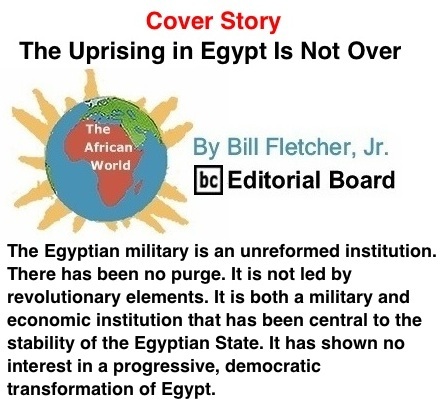


I have remained very cautious in responding to the events in Egypt. To this day it remains unclear to me whether what has unfolded is a popular uprising which drew in the military or whether it was a coup to forestall the success of a popular uprising. In either case my sense of Egyptian history has been to say that the military is completely untrustworthy and the Muslim Brotherhood is quite reactionary.
That said, a few points. First, the overthrow of Mubarak ultimately led to a democratic election. Morsi and the Brotherhood came out on top. It was not a slam-dunk and had the progressive forces been better organized, there might have been a more progressive outcome. But that is water under the bridge. Morsi's success appears to have led to overreach by the Brotherhood and a steady move in the direction of authoritarianism, including a crackdown on the Coptics, women and labor unions. Increasing repression, even after some concessions by Morsi, appears to have pushed forward the mass movement that we saw...in its millions.
The Egyptian military is an unreformed institution. There has been no purge. It is not led by revolutionary elements. It is both a military and economic institution that has been central to the stability of the Egyptian State. It has shown no interest in a progressive, democratic transformation of Egypt.
Whatever one concluded about the military's intervention in what I am calling an "uprising," it is clear that there have been serious consequences and we have not yet seen the end of it. Morsi supporters, predictably, protested, demonstrating that while there were millions calling for the end of the Morsi administration, the Morsi administration continues to have a very significant mass base.
And then came the massacre. While the Egyptian military claims that they were fired upon, as of this writing at least 51 protesters were killed, hundreds injured and perhaps one soldier killed. The military claims that they were attacked and, therefore, defended themselves. There has been no evidence presented of such an attack. By killing the protesters, the military has now weakened the anti-Morsi coalition. They may have also sent the country toward civil war.
Over the days I have been reading various commentaries from Egyptians on the situation. Many progressive individuals have upheld the involvement of the military in the uprising. I am not in Egypt and I am not an Egyptian. I am clear that this situation is quite complicated. But what I believe that I can suggest from this side of the ocean is that the Egyptian military needs to withdraw. There is little good that will be gained by their continued involvement. This massacre may have set in motion events that cannot be controlled, along the lines of Qaddafi's repression of dissent in Libya and Assad's repression in Syria. It may be that some Islamists will decide that the time has come for an armed solution. This is certainly what many jihaddists are suggesting at the moment.
The massacre must be condemned. The Egyptian
military is further discrediting itself. A political solution must be
found and it is likely that at least some wing of the Islamists will
need to be included in that political solution. And, it should go
without saying, that the USA should stay out of the internal affairs of
Egypt. If the Egyptians need assistance in mediating an end to this
conflict, the USA is far from being an honest broker. As I have argued
in the context of the increasing US intervention in Syria, the slogan
for the USA should be: "First, do no harm." In this case, stay out of
Egypt.
BlackCommentator.com Editorial Board member
and Columnist, Bill Fletcher, Jr., is a
Senior Scholar with the Institute for Policy Studies, the immediate past president of TransAfricaForum, and the author of “They’re
Bankrupting Us” - And Twenty Other Myths about Unions. He is also the co-author of Solidarity
Divided: The Crisis in Organized Labor and a New Path toward Social Justice, which examines the crisis of organized labor in the
 |







